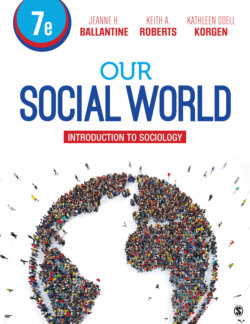Читать книгу Our Social World - Kathleen Odell Korgen - Страница 160
На сайте Литреса книга снята с продажи.
Parts of the Self
ОглавлениеThe self is composed of two distinct but closely related parts according to the symbolic interaction perspective—dynamic parts in interplay with one another (Mead [1934] 1962). The most basic element of the self is what symbolic interactionist George Herbert Mead refers to as the I, the spontaneous, unpredictable, impulsive, and largely unorganized aspect of the self. The I initiates behavior without considering the possible social consequences. We can see this at work in the “I want it now” behavior of a baby or a toddler. Cookie Monster, on the children’s television program Sesame Street, illustrates the I in every child, gobbling cookies at every chance and insisting on more now.
The I continues as part of the self throughout life but is controlled or tempered by the social expectations that surround individuals. In developmental stages from early childhood on, humans become increasingly influenced by interactions with others who instill society’s rules. Children develop the ability to see their self as others see them (role-taking), allowing them to critique the behavior initiated by the I. Mead called this reflective capacity of the self the Me. The Me is the part of the self that has learned the rules of society through interaction and role-taking, and it controls the I and its desires. Just as the I initiates the act, the Me gives direction to the act. In a sense, the Me channels the impulsive I in an acceptable manner according to societal rules and restraints yet meets the needs of the I as best it can. When we stop ourselves just before saying something and think to ourselves, I’d better not say that, it is our Me monitoring and controlling the I. Notice that the Me requires the ability to take the role of the other, to anticipate the other’s reaction.
Thinking Sociologically
For college students there are many temptations that tantalize and lure the I. What are some of these temptations, and how does the Me control them (or not)?
